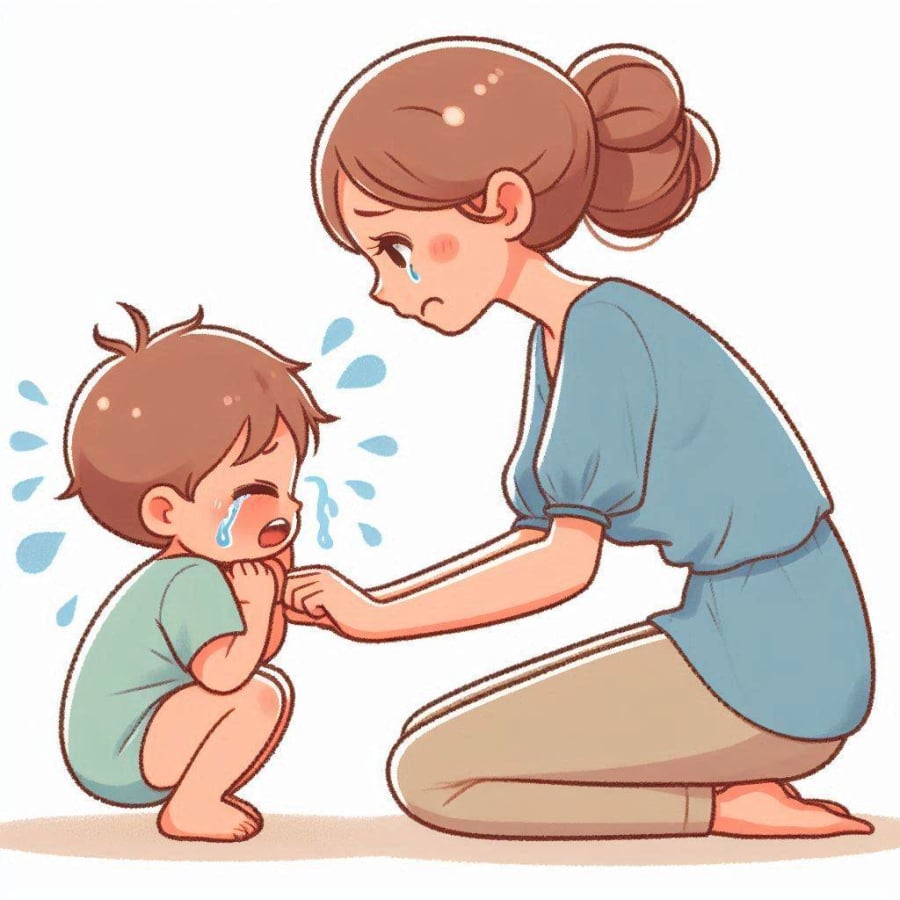In reality, many children’s “signs of distress” are often misinterpreted as being “well-behaved” or “sensitive.” As a result, when children exhibit changes in mood, parents often fail to recognize that their child needs attention and support.
There are three personality traits that parents should pay attention to, as they may indicate that a child is unhappy.
Always cautious and shy when meeting new people
Many children exhibit caution when interacting with others, due to concerns about causing trouble for those around them and a fear of not being loved. This caution becomes a “survival strategy” for the child, reflecting a scarcity of feelings of safety and acceptance.
In such situations, the child believes that staying silent and avoiding conflict is the most effective way to protect themselves and those around them.
These children often lack the necessary affection and support for their overall development. As a result, the world around them becomes unstable, and their psychology becomes vulnerable.

Always Cautious and Shy
They often feel like they are living in a shell, trying to protect themselves but also bearing the burden of loneliness. When faced with negative emotions, children often find it difficult to express or share their feelings, leading to repression. This repression not only causes a sense of heaviness but can also lead to mental health issues.
Moreover, when children lack the opportunity to express their emotions, they may develop unhealthy defense mechanisms. They gradually become closed off, lacking trust in others, and lose their ability to connect with those around them.
These children may appear well-behaved and understanding, but inside, they are experiencing a silent loneliness. Facing their fears and isolation, they feel that no one truly understands or cares about what they are going through.
Irritability and grumpiness in children
Children deserve to live in happiness every day! Happiness is not just an emotion but also the foundation for their overall development.
However, many children often feel irritable, as if they are bearing an invisible burden. They don’t feel cheerful about anything around them, and everything seems to lack appeal.
Children who are irritable often struggle with communication, especially with their parents. They feel that no one can understand their thoughts and feelings, so they choose to remain silent, creating a barrier between themselves and those around them.

Irritability and Grumpiness
The consequence of this silence leads to a sense of suffocation and loneliness, causing negative thoughts to accumulate. The lack of communication hinders their ability to express emotions, thereby impairing their social skill development.
Additionally, this irritable state can stem from various causes, including academic pressure, poor relationships with peers, or even family problems. When children feel a lack of attention or a stable support system, they are more likely to fall into a state of despondency.
When unable to express their emotions, children may seek to relieve pressure through rebellious behaviors, becoming grumpy, or even attracting attention in unhealthy ways.
Symptom of sighing in children
It may be hard to believe, but some children under 8 years old can sigh four to five times in an hour. While this action may seem unintentional, it actually reflects more complex psychological issues that adults tend to overlook.
Children who sigh frequently are sending out a cry for help but are unable to express their emotions clearly. They may be feeling pressured by academic or family relationship issues, and their powerlessness prevents them from finding solutions to these difficulties.
When children sigh, it’s not just a way to express discouragement or fatigue but also a signal that they feel trapped and lack a confidant. Sighing can be seen as an emotion-soothing mechanism, helping children convey their inner turmoil that words cannot express.
A child’s growth is not just about completing tasks or achieving academic success. It also includes the ability to master and express emotions naturally and, more importantly, develop self-confidence.
3 Proven Strategies for Parents to Help Their Kids Overcome Video Game Addiction
“With the ever-growing presence of technology, an increasing number of children are drawn to the world of gaming, sometimes even bordering on addiction. Many parents are left wondering what to do when their child becomes obsessed with video games. This article aims to provide valuable insights and practical tips to address this modern-day concern.”



































